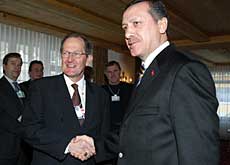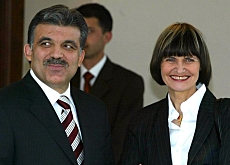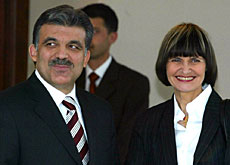Turkey rejects Swiss genocide-denial inquiry
Turkey's foreign minister, Abdullah Gül, has criticised Switzerland for briefly detaining a Turkish politician on suspicion of violating Swiss anti-racism laws.
Doğu Perinçek, who is leader of Turkey’s Workers’ Party, has twice denied that the killings of Armenians around the time of the First World War amounted to genocide. He is the subject of two criminal investigations.
Under Swiss law, any act of denying, belittling or justifying genocide is a violation of the country’s anti-racism laws.
“It is not possible for us to accept these things to be done to the leader of a political party in Turkey,” Gül was quoted in the Hürriyet newspaper.
“Do these actions suit a country like Switzerland?” he asked.
Questioned
The public prosecutor of Winterthur questioned Perinçek on Saturday for more than two hours after a news conference he gave on Friday in Glattbrugg, near Zurich.
In the speech honouring the 82nd anniversary of the Treaty of Lausanne, which fixed the borders of modern-day Turkey, Perinçek called claims of genocide against the Armenians an imperialist lie, authorities said.
Perinçek is also under investigation from authorities in canton Vaud after a complaint from a Swiss-Armenian Society over a speech he gave in Lausanne in May.
Gül described Saturday’s questioning as “unacceptable” and “absolutely contrary to the principle of free speech”.
On Sunday, Perinçek repeated his denial of the Armenian genocide at celebrations attended by about 2,000 Turks near the Beau-Rivage hotel, scene of the treaty negotiations.
Kurds
About 300 Kurds, who also marked the anniversary, demonstrated in front of the Palais de Rumine where the treaty was signed.
Speakers criticised the treaty, which had “made a mockery of the hope for freedom” of Turkish minorities.
Armenians say 1.5 million of their people were killed as the Ottoman Empire forced them from eastern Turkey between 1915 and 1923. They argue that this was a deliberate campaign of genocide by Turkey’s rulers at that time.
Turks say the death count is inflated and insist that Armenians were killed or displaced as the Ottoman Empire tried to secure its border with Russia and stop attacks by Armenian militants.
Switzerland and Turkey have argued over the issue in the past.
In June, a Turkish cabinet minister postponed a visit to Switzerland to protest against a Swiss investigation of a Turkish historian who made a similar speech denying that the mass killings of Armenians in the early 1900s amounted to genocide.
Swiss Foreign Minister Micheline Calmy-Rey had been scheduled to travel to Turkey in 2003, but Ankara withdrew its invitation after the parliament of a western Swiss canton recognised the killings of Armenians in Turkey as genocide.
Calmy-Rey visited Turkey in March (see related story).
swissinfo with agencies
The Treaty of Lausanne was signed in 1923 between European nations and the Turkish Grand National Assembly.
The text defined the borders of the young Turkish republic, led by Mustafa Kemal Atatürk.
Jews, Greeks and Armenians received the status of minorities.
But the Kurdish population was not recognised as such.
Tensions have surfaced again between Turkey and Switzerland. Turkey is upset at the detention and questioning of a Turkish politician suspected of having violated Swiss anti-racism laws.
During meetings in Switzerland, Doğu Perinçek offered revisionist views about the Armenian genocide.
The historical interpretation of the death of between 800,000 and 1,800,000 between 1915 and 1918 has caused tension between Bern and Ankara for years.

In compliance with the JTI standards
More: SWI swissinfo.ch certified by the Journalism Trust Initiative



You can find an overview of ongoing debates with our journalists here . Please join us!
If you want to start a conversation about a topic raised in this article or want to report factual errors, email us at english@swissinfo.ch.